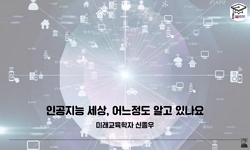The purpose of this study is to develop an educational program for learning deep learning concepts for elementary school students. First of all, based on literature and previous research, a group of experts was discussed to establish the criteria for ...
http://chineseinput.net/에서 pinyin(병음)방식으로 중국어를 변환할 수 있습니다.
변환된 중국어를 복사하여 사용하시면 됩니다.
- 中文 을 입력하시려면 zhongwen을 입력하시고 space를누르시면됩니다.
- 北京 을 입력하시려면 beijing을 입력하시고 space를 누르시면 됩니다.
https://www.riss.kr/link?id=A106495250
- 저자
- 발행기관
- 학술지명
- 권호사항
-
발행연도
2019
-
작성언어
Korean
-
주제어
Artificial Intelligence ; Machine Learning ; Deep Learning ; CNN ; SW education ; 인공지능 ; 기계학습 ; 딥러닝 교육 ; 컨볼루션네트워크 ; 소프트웨어교육
-
등재정보
KCI등재
-
자료형태
학술저널
- 발행기관 URL
-
수록면
583-590(8쪽)
-
KCI 피인용횟수
43
- DOI식별코드
- 제공처
- 소장기관
-
0
상세조회 -
0
다운로드
부가정보
다국어 초록 (Multilingual Abstract)
The purpose of this study is to develop an educational program for learning deep learning concepts for elementary school students. First of all, based on literature and previous research, a group of experts was discussed to establish the criteria for the direction of program development. The model of education program was developed the deep-learning teaching method based on CT element-oriented teaching and learning model. The subject of the developed program is the artificial intelligence image recognition CNN algorithm, and we have developed 9 educational programs. We applied the program over six weeks to sixth graders. he test of learning suitability for the education program was analyzed through the validity of the experts and the survey on the satisfaction of learners. Expert validity analysis showed that the minimum CVR value was more than .56. The fitness level of learner level and the level of teacher guidance were less than .80, and the fitness of learning environment and media above .96 was high. Although it is difficult for teachers due to the unfamiliar material of artificial intelligence, it can be seen that the class can be applied through the approach of using the unplugged CS that was implemented in the existing SW education. The students' satisfaction analysis showed that the learners actively participated in the class. Students gave a positive evaluation of the average of 4.0 or higher on the understanding, benefit, interest, and learning materials of artificial intelligence learning. Therefore, it can be seen that the educational program developed in this study can provide a foundation for artificial intelligence teaching and learning materials in elementary school.
국문 초록 (Abstract)
본 연구의 목적은 초등학생을 대상으로 한 딥러닝 개념 학습을 위한 교육 프로그램을 개발하는 것이다. 먼저 문헌연구와 선행연구를 토대로 전문가 그룹 토의를 진행하여 프로그램 개발 방...
본 연구의 목적은 초등학생을 대상으로 한 딥러닝 개념 학습을 위한 교육 프로그램을 개발하는 것이다. 먼저 문헌연구와 선행연구를 토대로 전문가 그룹 토의를 진행하여 프로그램 개발 방향을 위한 준거를 세웠다. 프로그램의 모델은 CT요소 중심 모델을 토대로 딥러닝 교수학습모델을 개발하였다. 개발한 프로그램의 주제는 인공지능의 이미지인식 CNN알고리즘으로 정하고, 9개 차시 교육프로그램을 개발하였다. 프로그램은 6학년을 대상으로 2주간에 걸쳐 적용을 하였다. 프로그램에 대한 학습 적합도 검사는 전문가들의 타당도와 학습자 만족도 설문 검사를 통해 분석하였다. 전문가 타당도 분석 결과 최소 CVR값이 .56이상을 넘어 타당하게 나왔다. 학습자 수준 적합도와 교사 지도 수준의 적합도 문항의 경우 .80이하로 나타났으며 .96이 넘은 학습 환경과 매체의 적합도 문항에서는 높게 나타났다. 낯선 소재로 인해 교사들이 어려워하기는 하지만 기존 SW 교육에서 실시했던 언플러그드 CS 활용의 접근법을 통해 수업의 적용이 가능함을 보여주고 있음을 알 수 있었다. 학생들의 만족도 분석 결과 학습자들의 참여는 적극적으로 하였음을 알 수 있었고, 인공지능 학습의 이해도와 유익성, 흥미도, 학습자료 등에 대해서 평균 4.0이상을 보여 긍정적인 평가를 하였다. 이에 본 프로그램은 초등학교 현장에서의 인공지능 교수학습자료의 토대를 제공할 수 있음을 알 수 있다.
참고문헌 (Reference)
1 김갑수, "초등학생의 인공지능 교육을 위한 교수 학습 모델 개발 및 적용" 한국정보교육학회 21 (21): 137-147, 2017
2 김진수, "초등과정 인공지능 학습 원리 이해를 위한 보드게임 기반 게이미피케이션 교육 실증" 한국정보교육학회 23 (23): 229-235, 2019
3 류미영, "초등 교사들의 인공지능에 관한 교육적 인식" 한국정보교육학회 22 (22): 317-324, 2018
4 류미영, "의미분별법을 이용한 초등학생의 인공지능에 대한 이미지" 한국정보교육학회 21 (21): 527-535, 2017
5 Borge. N., "White paper-Artificial Intelligence to Improve Education Learning Challenges" 2 (2): 10-13, 2016
6 M. Y. Choi, "The status of Artificial Intelligence in education and Prediction of change in roles of teacher and school" 23 (23): 85-88, 2019
7 S. K. Han, "Teaching Strategy of Intelligent Systems Course with Unplugged Computing" 1 (1): 250-255, 2010
8 J. S. Kim, "Study on Development of Teaching and Learning Model for Software Education" Korea Education Development Institute & KERIS 2016
9 CSTA, "K-12 Guidelines for Artificial Intelligence:What Students Should Know. AI4K12"
10 S. Popenici, "Exploring the impact of artificial intelligence on teaching and learning in higher education" 12 (12): 1-13, 2017
1 김갑수, "초등학생의 인공지능 교육을 위한 교수 학습 모델 개발 및 적용" 한국정보교육학회 21 (21): 137-147, 2017
2 김진수, "초등과정 인공지능 학습 원리 이해를 위한 보드게임 기반 게이미피케이션 교육 실증" 한국정보교육학회 23 (23): 229-235, 2019
3 류미영, "초등 교사들의 인공지능에 관한 교육적 인식" 한국정보교육학회 22 (22): 317-324, 2018
4 류미영, "의미분별법을 이용한 초등학생의 인공지능에 대한 이미지" 한국정보교육학회 21 (21): 527-535, 2017
5 Borge. N., "White paper-Artificial Intelligence to Improve Education Learning Challenges" 2 (2): 10-13, 2016
6 M. Y. Choi, "The status of Artificial Intelligence in education and Prediction of change in roles of teacher and school" 23 (23): 85-88, 2019
7 S. K. Han, "Teaching Strategy of Intelligent Systems Course with Unplugged Computing" 1 (1): 250-255, 2010
8 J. S. Kim, "Study on Development of Teaching and Learning Model for Software Education" Korea Education Development Institute & KERIS 2016
9 CSTA, "K-12 Guidelines for Artificial Intelligence:What Students Should Know. AI4K12"
10 S. Popenici, "Exploring the impact of artificial intelligence on teaching and learning in higher education" 12 (12): 1-13, 2017
11 Y. J. Jang, "Development of unplugged education program for elementary school AI classes" Seoul National University of Education 2019
12 "China AI Textbook"
13 Francesc. P., "Artificial intelligence in education: challenges and opportunities for sustainable development. Unesco Report for Education 2030" Unesco 2019
14 Holmes. W., "Artificial Intelligence In Education Promises and Implications for Teaching and Learning" The Center for Curriculum Redesign 2019
15 S. H. . Kim, "Analysis of International Educational Trends and Learning Tools for Artificial Intelligence Education" 23 (23): 25-28, 2019
16 "AI4children"
17 "AI4ALL"
18 House of Lords, "AI in the UK: ready, willing and able?" Select Committee on Artificial Intelligence 2018
19 "AI for Kids"
동일학술지(권/호) 다른 논문
-
- 한국정보교육학회
- Hyewon Lee
- 2019
- KCI등재
-
- 한국정보교육학회
- 전석주
- 2019
- KCI등재
-
- 한국정보교육학회
- 류미영
- 2019
- KCI등재
-
- 한국정보교육학회
- 전유현
- 2019
- KCI등재
분석정보
인용정보 인용지수 설명보기
학술지 이력
| 연월일 | 이력구분 | 이력상세 | 등재구분 |
|---|---|---|---|
| 2022 | 평가예정 | 재인증평가 신청대상 (재인증) | |
| 2019-01-01 | 평가 | 등재학술지 유지 (계속평가) |  |
| 2016-01-01 | 평가 | 등재학술지 유지 (계속평가) |  |
| 2012-01-01 | 평가 | 등재학술지 유지 (등재유지) |  |
| 2009-01-01 | 평가 | 등재학술지 선정 (등재후보2차) |  |
| 2008-01-01 | 평가 | 등재후보 1차 PASS (등재후보1차) |  |
| 2007-01-01 | 평가 | 등재후보학술지 유지 (등재후보1차) |  |
| 2006-01-01 | 평가 | 등재후보 1차 FAIL (등재후보1차) |  |
| 2005-01-01 | 평가 | 등재후보학술지 유지 (등재후보1차) |  |
| 2004-01-01 | 평가 | 등재후보학술지 유지 (등재후보1차) |  |
| 2002-01-01 | 평가 | 등재후보학술지 선정 (신규평가) |  |
학술지 인용정보
| 기준연도 | WOS-KCI 통합IF(2년) | KCIF(2년) | KCIF(3년) |
|---|---|---|---|
| 2016 | 1.5 | 1.5 | 1.45 |
| KCIF(4년) | KCIF(5년) | 중심성지수(3년) | 즉시성지수 |
| 1.41 | 1.25 | 1.991 | 0.38 |





 ScienceON
ScienceON eArticle
eArticle







